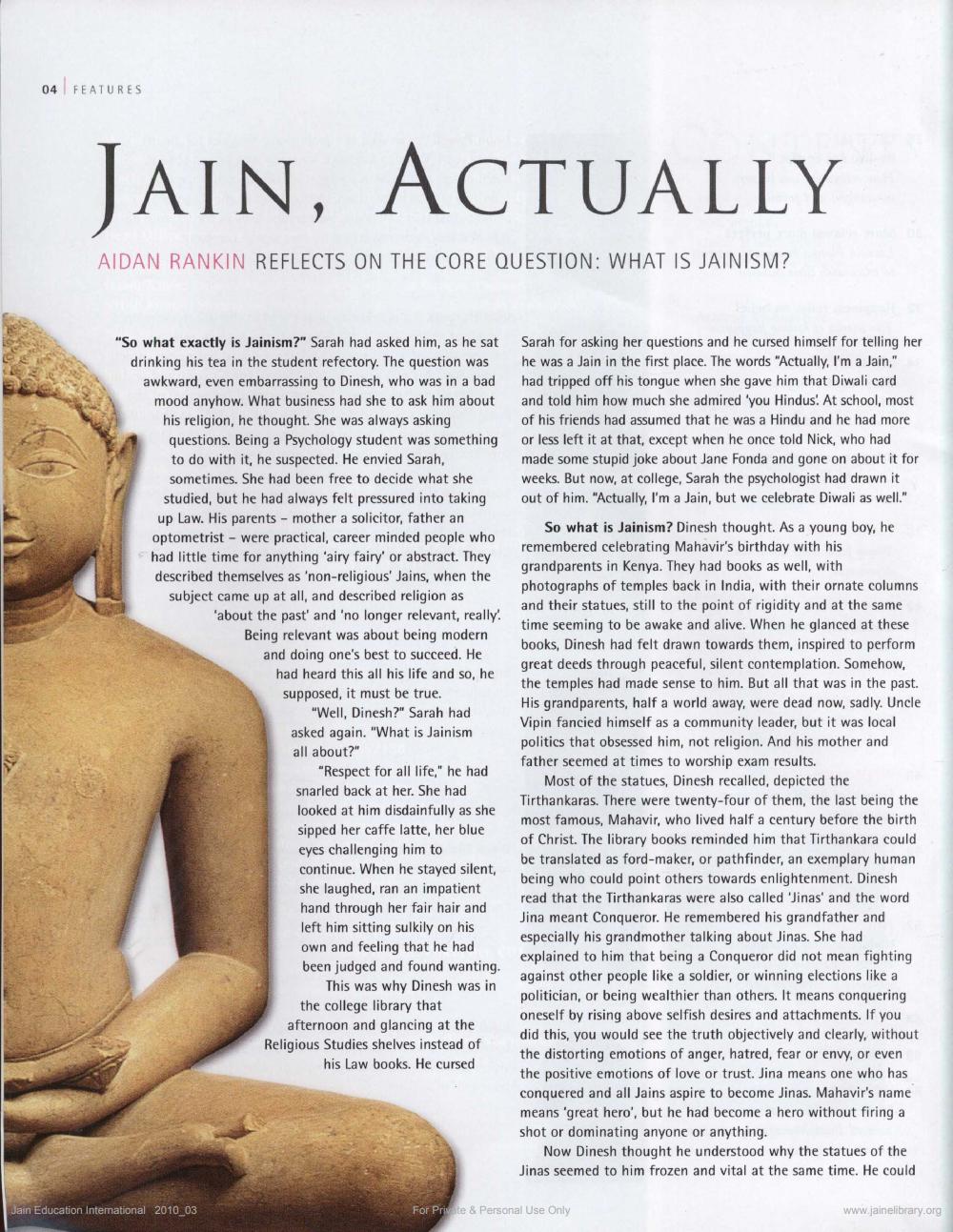Book Title: Jain Spirit 2004 03 No 18 Author(s): Jain Spirit UK Publisher: UK Young Jains View full book textPage 6
________________ 04 FEATURES JAIN, ACTUALLY AIDAN RANKIN REFLECTS ON THE CORE QUESTION: WHAT IS JAINISM? "So what exactly is Jainism?" Sarah had asked him, as he sat drinking his tea in the student refectory. The question was awkward, even embarrassing to Dinesh, who was in a bad mood anyhow. What business had she to ask him about his religion, he thought. She was always asking questions. Being a Psychology student was something to do with it, he suspected. He envied Sarah, sometimes. She had been free to decide what she studied, but he had always felt pressured into taking up Law. His parents - mother a solicitor, father an optometrist - were practical, career minded people who had little time for anything 'airy fairy' or abstract. They described themselves as 'non-religious' Jains, when the subject came up at all, and described religion as 'about the past' and 'no longer relevant, really! Being relevant was about being modern and doing one's best to succeed. He had heard this all his life and so, he supposed, it must be true. "Well, Dinesh?" Sarah had asked again. "What is Jainism all about?" Jain Education International 2010_03 Sarah for asking her questions and he cursed himself for telling her he was a Jain in the first place. The words "Actually, I'm a Jain," had tripped off his tongue when she gave him that Diwali card and told him how much she admired 'you Hindus. At school, most of his friends had assumed that he was a Hindu and he had more or less left it at that, except when he once told Nick, who had made some stupid joke about Jane Fonda and gone on about it for weeks. But now, at college, Sarah the psychologist had drawn it out of him. "Actually, I'm a Jain, but we celebrate Diwali as well." So what is Jainism? Dinesh thought. As a young boy, he remembered celebrating Mahavir's birthday with his grandparents in Kenya. They had books as well, with photographs of temples back in India, with their ornate columns and their statues, still to the point of rigidity and at the same time seeming to be awake and alive. When he glanced at these books, Dinesh had felt drawn towards them, inspired to perform great deeds through peaceful, silent contemplation. Somehow, the temples had made sense to him. But all that was in the past. His grandparents, half a world away, were dead now, sadly. Uncle Vipin fancied himself as a community leader, but it was local politics that obsessed him, not religion. And his mother and father seemed at times to worship exam results. "Respect for all life," he had snarled back at her. She had looked at him disdainfully as she sipped her caffe latte, her blue eyes challenging him to continue. When he stayed silent, she laughed, ran an impatient hand through her fair hair and left him sitting sulkily on his own and feeling that he had Most of the statues, Dinesh recalled, depicted the Tirthankaras. There were twenty-four of them, the last being the most famous, Mahavir, who lived half a century before the birth of Christ. The library books reminded him that Tirthankara could be translated as ford-maker, or pathfinder, an exemplary human being who could point others towards enlightenment. Dinesh read that the Tirthankaras were also called 'Jinas' and the word Jina meant Conqueror. He remembered his grandfather and especially his grandmother talking about Jinas. She had explained to him that being a Conqueror did not mean fighting been judged and found wanting. against other people like a soldier, or winning elections like a This was why Dinesh was in the college library that afternoon and glancing at the Religious Studies shelves instead of his Law books. He cursed politician, or being wealthier than others. It means conquering oneself by rising above selfish desires and attachments. If you did this, you would see the truth objectively and clearly, without the distorting emotions of anger, hatred, fear or envy, or even the positive emotions of love or trust. Jina means one who has conquered and all Jains aspire to become Jinas. Mahavir's name means 'great hero', but he had become a hero without firing a shot or dominating anyone or anything. Now Dinesh thought he understood why the statues of the Jinas seemed to him frozen and vital at the same time. He could For Private & Personal Use Only www.jainelibrary.orgPage Navigation
1 ... 4 5 6 7 8 9 10 11 12 13 14 15 16 17 18 19 20 21 22 23 24 25 26 27 28 29 30 31 32 33 34 35 36 37 38 39 40 41 42 43 44 45 46 47 48 49 50 51 52 53 54 55 56 57 58 59 60 61 62 ... 70
